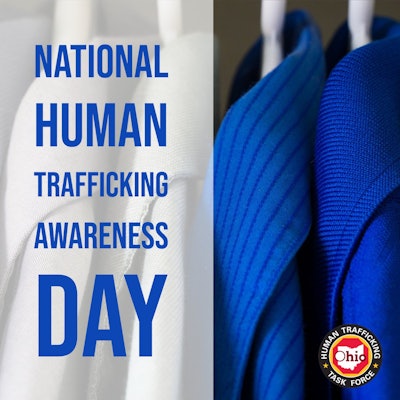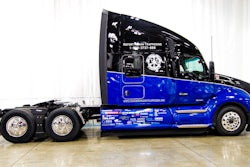
Today, Jan. 11, is #WearBlueDay, otherwise known as National Human Trafficking Awareness Day, part of the U.S. Department of Homeland Security’s Blue Campaign. Members of the Commercial Vehicle Safety Alliance of law enforcement and trucking-industry representatives around the nation, among many others, will demonstrate solidarity with victims of human trafficking by wearing blue and contributing on social media using the hashtag #WearBlueDay.
In a recent release to members, CVSA representatives highlighted January as National Slavery and Human Trafficking Prevention Month in the United States. Both halves of CVSA’s membership, the organization said, fully support the cause and are “committed to bringing awareness to the crime of human trafficking and working together to prevent human trafficking throughout Canada, Mexico and the United States.”
Human trafficking is the recruitment, transportation, transfer, harboring or receipt of persons by force, coercion, abduction, fraud, deception, etc., to control a person for the purpose of exploitation, such as sexual exploitation or forced labor.
According to the International Labour Organization, forced labor and human trafficking is a $150 billion industry worldwide. In 2017, the U.S. National Human Trafficking Hotline received reports of 8,524 suspected human trafficking cases. In Canada, there were 340 incidents of human trafficking in 2016, according to police-reported data.

“As members of law enforcement who inspect commercial motor vehicles, CVSA member jurisdictions throughout North America serve as the eyes and ears of our nation’s roadways,” said CVSA President Lt. Scott Carnegie with the Mississippi Highway Patrol. “Inspectors serve in a hands-on capacity that grants them prime access and opportunity to potentially identify and recover individuals who are being trafficked using our roadways.”
In addition to taking part in Jan. 11 Wear Blue campaigns, CVSA is likewise participating in the Truckers Against Trafficking (TAT) Everyday Heroes Truck Press Conference at 10 a.m. on the National Mall in Washington, D.C., the organization says. TAT will debut its Everyday Heroes Truck and will offer tours of the Freedom Drivers Project, a full-scale tractor-trailer retrofitted into a mobile anti-trafficking educational museum. Jan. 15-18, commercial motor vehicle drivers who are inspected in participating jurisdictions may receive a TAT wallet card and/or a window cling from inspectors, along with information on how drivers can identify and report human trafficking situations.
Recognizing professional truckers as front-line eyes and ears in the battle against trafficking, the TAT organization has been promoting a hotline to the National Human Trafficking Resource Center for many years, through which truckers can report suspected instances of human trafficking directly — 888-3737-888 — generating more than 600 cases in the organization’s history and identifying more than 1,100 victims:
Don't forget to wear BLUE on Jan. 11, to show your support for National Human Trafficking Awareness Day! #WearBlueDay pic.twitter.com/Hr3gMRXKw5
— Anti-HTCoordinator (@OhioAntiHTrfk) January 8, 2019
The 2018 Combating Human Trafficking in Commercial Vehicles Act expanded the scope of activities under the Federal Motor Carrier Safety Administration’s outreach and education program to include human trafficking prevention; established a human trafficking prevention coordinator position within the U.S. Department of Transportation; expanded the commercial driver’s license financial assistance program to include recognition, prevention and reporting of human trafficking; and established the creation of an advisory committee on human trafficking.
In October 2018, CVSA Operation Safe Driver Program Chair Chief David Lorenzen, with the Iowa Department of Transportation, was appointed to the U.S. Department of Transportation’s Advisory Committee on Human Trafficking (ACHT). ACHT provides information, advice and recommendations to the U.S. DOT on matters related to human trafficking and develops recommended best practices for state and local transportation stakeholders in combating human trafficking. Chief Lorenzen represents CVSA and the law enforcement perspective as an active member on the national advisory committee.









